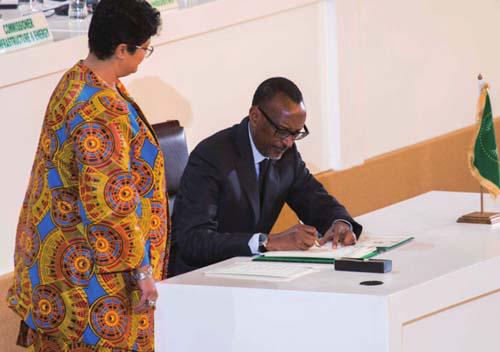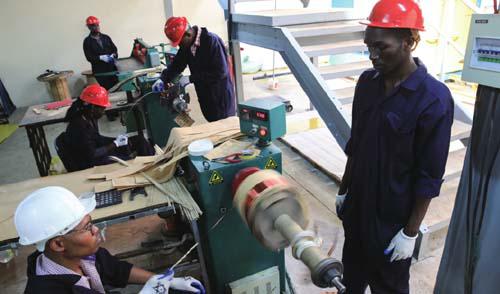Continental Unity
2018-09-20ByBenardAyieko
By Benard Ayieko

The African Union (AU), established in 2001 to replace the defunct Organization of African Unity founded in 1963, was formed to hasten the regional integration process in Africa to enable it to play its rightful role in the global economy. The AU has created an effective platform for its member states to coordinate positions on matters of common concern to the continent in international fora, and to defend the interests of Africa effectively. It is this unity of purpose that gave birth to the celebrated Agenda 2063—a 50-year, continent-wide, people-driven plan outlining the "Africa We Want." The Agenda 2063 is a strategic framework for the socioeconomic transformation of Africa.
Continental blueprint
But what does Agenda 2063 aspire to achieve? Its main objective is to create a prosperous Africa based on inclusive growth and sustainable, people-driven development. It also aims to create a continent that is strong, united, resilient and influential—this has opened Africa up to numerous opportunities and challenges. World economic powers like China, India, the United States and Japan have upped the ante by hosting African heads of state at various development summits. Japan hosts the Tokyo International Conference on African Development; the United States the U.S.-Africa Business Summit; India the India-Africa Forum; and China the Forum on China-Africa Cooperation (FOCAC). Chinas successful collaboration with Africa in the economic sphere has brought FOCACs role in driving China-Africa cooperation into sharp focus. Since FOCACs inauguration in 2000, the forum has focused on trade, investment and technical cooperation, resulting in the multi-sectoral growth of Sino-African development.
FOCAC has emerged as a key channel of engagement for many African nations over the last decade because of its favorable agenda that resonates with the development needs of the continent. With established diplomatic relations between China and 53 African countries, cooperation has been strengthened through the creation of sub-fora within the framework of FOCAC.
In addition to ministerial conferences, FOCAC also holds summits. The Third FOCAC Summit, held in Beijing in early September, has offered African countries the opportunity to increase cooperation with China to realize the aspirations of the Agenda 2063 in light of evolving geopolitical dynamics around the world. The implementation of a continental development blueprint is periodic, with the first phase requiring 10 years and focusing on fl agship projects that include an integrated high-speed railway network, an African virtual and e-university, African commodity strategy, Continental Free Trade Area, the Grand Inga Dam in the Democratic Republic of the Congo, continental financial institutions and a single air transportation network.
These are areas in which the Chinese have valuable experiences which they shared with their African counterparts at the FOCAC Beijing Summit. With a combined population of 2.6 billion people and a GDP of $16.28 trillion, China and Africa already have a solid foundation in place from which to heighten their cooperation. The FOCAC Beijing Summit offered African countries an opportunity to not only broaden the scope and benefits of Agenda 2063, but also propose new measures to deal with the issues of industrialization, trade imbalances, job creation for the youth, food security, energy, security, public health and disease prevention.
The benefits of the FOCAC Beijing Summit to Africa cannot be denied, and the event was pivotal in catapulting Africa into meaningful partnerships through which its nations can grow their exports not only to China, but to the other parts of the world as well. This can be achieved by tapping Chinese experiences and practices in trade competitiveness.
African countries depend heavily on primary products for exports and foreign earnings which have minimal added value. It is thus imperative for Africa to learn from the Chinese on how to process primary products so that they can gain competitiveness in the international market and earn higher margins. This will expand the size of the market for African exports and will help reduce trade deficits, increasing the balance of payments and foreign exchange earnings.
Cooperative projects
The African countries which participated in the FOCAC Beijing Summit had an opportunity to talk with China about adopting modern and affordable Chinese technology that can promote efficiency in the production of goods and services for both domestic and international use. Information and communications technology is an enabler of growth and development and will be instrumental in creating jobs for the youth.
Most of Chinas infrastructure projects in Africa are located in urban areas. The FOCAC Beijing Summit provided a chance for African leaders to engage China on the implementation of more infrastructure projects targeting rural areas to reduce rural-urban migration, alleviate poverty and spur rural development.
The FOCAC Beijing Summit was also conducive to boosting Chinese tourists to Africa. Despite the flourishing of SinoAfrican relations, there is disquiet on the current number of visitor arrivals from China. In fact, the share of tourists from China to Africa is just 1.5 percent of the total outbound Chinese tourists, with only Kenya, South Africa, Mauritius, Morocco, Egypt, Namibia, Cape Verde, Botswana, Tunisia and Tanzania emerging as competitive tourist destinations for the Chinese.
For the continent to be stronger as a trading bloc, it is important to adopt competitive global currencies away from the traditional reverence of the U.S. dollar, British pound and euro. Thus the renminbi becomes a preferable choice, which will help safeguard Africas currencies from unprecedented local currency volatilities, and potential economic stability.
Some have described Chinese infrastructure loans to Africa as a new face of neocolonialism, but Professor Ching Kwan Lee of the University of California argues that China-Africa cooperation has helped Africa stand on its own, rather than making the continent dependent on China. Lee believes that the more than 10,000 Chinese enterprises operating in Africa have promoted Africas independence and autonomy rather than the usual dependence commonly associated with colonialism.
China and Africas is a two-way relationship built on mutual benefit. For Africa to move toward becoming a peaceful, prosperous and integrated continent based on inclusive growth and sustainable development in line with the Agenda 2063 mission statement, collaboration with China must be given even more room to grow.
